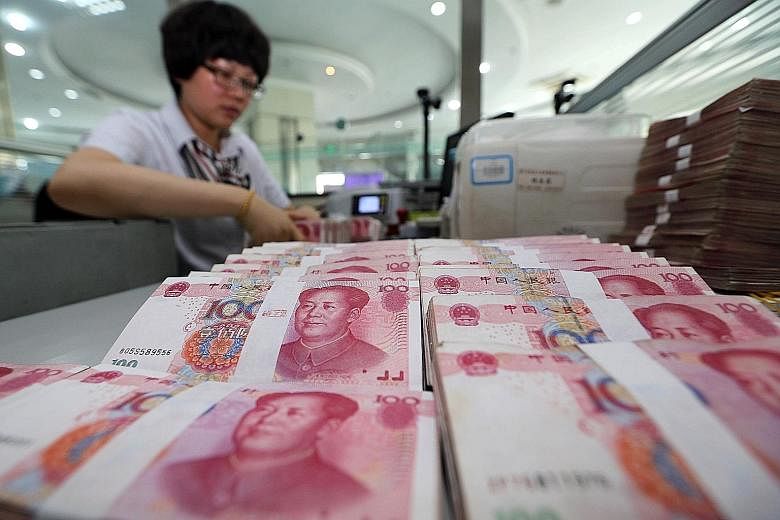BEIJING • China's foreign exchange reserves reported their biggest quarterly decline on record in the July- September period, as the central bank stepped up intervention to stabilise the yuan and calm sentiment after an unexpected devaluation of its currency had jolted global markets.
China's reserves, the world's largest, dropped US$43.3 billion (S$61.3 billion) to US$3.514 trillion last month, central bank data showed yesterday, and were down by about US$180 billion in the third quarter in their largest-ever quarterly fall, according to Reuters data going back to 1980.
The Aug 11 devaluation of the yuan and the consequent fall in reserves have raised questions about how sustainable China's efforts to support the currency are, as capital trickles out of the country due to fears of a deepening economic slowdown and prospects of rising US interest rates.
Analysts expect the reserves to fall further. "The decline in China's foreign reserves, while less than market expected, still shows (the) central bank continued the market intervention," said Singapore- based Zhou Hao, senior economist in Asia at Commerzbank.
"As (the People's Bank of China) also intervened in the forward market in the past month, the foreign reserves will likely plunge again when these forward contracts mature," he said.
Policymakers have been determined to calm sentiment after a summer rout in stocks, the yuan devaluation and a series of clumsy attempts by the authorities to stabilise equities spread turmoil in global financial markets.
Beijing is also pressing on with attempts to ease concerns about a cooling economy, which is growing at its slowest pace in decades.
The yuan devaluation had sparked worries of a global currency war and raised doubts about Beijing's ability to manage an economy transitioning from an investment- and export-led model to one driven by domestic demand.
Indeed, policy insiders have told Reuters that China was so surprised by the reaction to the devaluation that it is likely to keep the yuan on a tight leash in the near term.
Although the People's Bank of China has said it sees no need for further falls in the yuan, markets expect the currency to decline more over the coming year to reflect a faltering economy.
In the short term, however, analysts say Beijing is keen to restore investor confidence even as a rapid volley of economic and market support measures has produced mixed results so far.
Mr Tim Condon, Singapore- based head of research for Asia at ING Bank, believes Beijing is pushing for the onshore and offshore yuan forward curves to converge again, a situation that prevailed just before the currency was devalued.
"I think their strategy to bring that about is to stablilise the spot rate, intervene in the offshore and the onshore spot markets and hope that the economic data kind of portrays a recovering economy and confidence comes back a bit more," he said.
"And I think that strategy's working."
REUTERS

